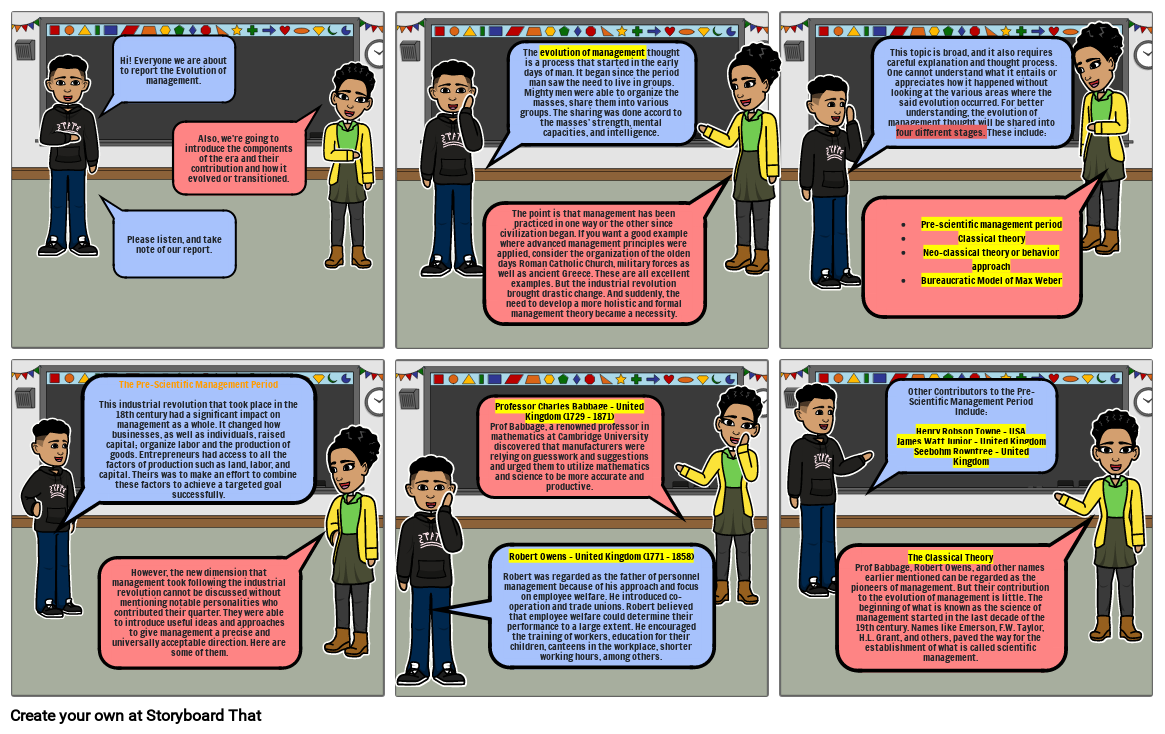Evolution of management pt 1

Storyboard Text
- Hi! Everyone we are about to report the Evolution of management.
- Please listen, and take note of our report.
- Also, we're going to introduce the components of the era and their contribution and how it evolved or transitioned.
- The point is that management has been practiced in one way or the other since civilization began. If you want a good example where advanced management principles were applied, consider the organization of the olden days Roman Catholic Church, military forces as well as ancient Greece. These are all excellent examples. But the industrial revolution brought drastic change. And suddenly, the need to develop a more holistic and formal management theory became a necessity.
- The evolution of management thought is a process that started in the early days of man. It began since the period man saw the need to live in groups. Mighty men were able to organize the masses, share them into various groups. The sharing was done accord to the masses’ strength, mental capacities, and intelligence.
- This topic is broad, and it also requires careful explanation and thought process. One cannot understand what it entails or appreciates how it happened without looking at the various areas where the said evolution occurred. For better understanding, the evolution of management thought will be shared into four different stages. These include:
- Pre-scientific management periodClassical theoryNeo-classical theory or behavior approachBureaucratic Model of Max Weber
- The Pre-Scientific Management PeriodThis industrial revolution that took place in the 18th century had a significant impact on management as a whole. It changed how businesses, as well as individuals, raised capital; organize labor and the production of goods. Entrepreneurs had access to all the factors of production such as land, labor, and capital. Theirs was to make an effort to combine these factors to achieve a targeted goal successfully.
- However, the new dimension that management took following the industrial revolution cannot be discussed without mentioning notable personalities who contributed their quarter. They were able to introduce useful ideas and approaches to give management a precise and universally acceptable direction. Here are some of them.
- Robert Owens – United Kingdom (1771 – 1858)Robert was regarded as the father of personnel management because of his approach and focus on employee welfare. He introduced co-operation and trade unions. Robert believed that employee welfare could determine their performance to a large extent. He encouraged the training of workers, education for their children, canteens in the workplace, shorter working hours, among others.
- Professor Charles Babbage – United Kingdom (1729 – 1871)Prof Babbage, a renowned professor in mathematics at Cambridge University discovered that manufacturers were relying on guesswork and suggestions and urged them to utilize mathematics and science to be more accurate and productive.
- The Classical TheoryProf Babbage, Robert Owens, and other names earlier mentioned can be regarded as the pioneers of management. But their contribution to the evolution of management is little. The beginning of what is known as the science of management started in the last decade of the 19th century. Names like Emerson, F.W. Taylor, H.L. Grant, and others, paved the way for the establishment of what is called scientific management.
- Other Contributors to the Pre-Scientific Management Period Include:Henry Robson Towne – USAJames Watt Junior – United KingdomSeebohm Rowntree – United Kingdom
Over 30 Million Storyboards Created

